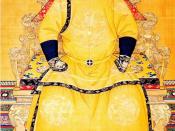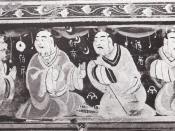Women in China during the Qing dynasty
Ideal Moral Values for Chinese Women
We have seen that Confucius regarded filial piety as the root virtue from which all others derive. Later developments in Chinese thought on morality and ethics continued to reaffirm this view. For men, filial piety was clearly the root virtue. Women, too, were expected to be filial, but by late imperial times, "chastity" (zhen ) received even greater emphasis as the foundational female virtue. Indeed, the Qing rulers promoted chastity to the point where it became virtually a cult. The Han dynasty was a time when several important morality books for and about women were published. These books became classics and were reprinted, revised, expanded on, and read in upper class households in all later dynasties especially during Qing dynasty. One of these classical morality texts was Biographies of Exemplary Women (Lienu zhuan). Even a brief analysis of this text would be too lengthy for this assignment.
Owing, however, to the tremendous importance of chastity in Qing dynasty let me consider two typical biographies that illustrate this virtue. I begin with the biography of "Chaste Jiang". Jiang was the wife of King Zhao of Chu. One day the king departed for a trip and left his wife behind at the Jian Terrace. While he was away, the king heard that heavy rains were causing the river near the terrace to rise, so he sent an official to take Jiang to a safer location. In his rush, however, the official neglected to bring his seal of commission (a badge to indicate that he was on official business). When the official arrived and asked Jiang to come with him, she replied, "The king has an agreement with his palace ladies that if he sends a summons he must...


